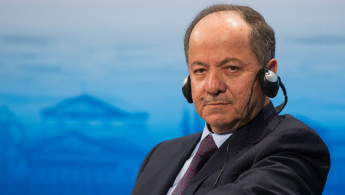Iraqi Kurds remain divided over constitution
Kurdish parties in Iraq have clashed over amendments to the constitution of the Kurdistan Region of Iraq.
The differences are over issues including sharing territories with Iraq, the status of the regional capital, the distribution of arms between governorates and Kurdish parties, and relations with Iraq, Iran, Turkey, and the West.
The main unresolved issue is the next president of the Kurdistan region. Current president Massoud Barzani wants the consitution to be amended so he can extend his term. However, the city of Sulaymaniyah has said if this happens it will try to become independent.
Some have accused Iran of trying to drive a wedge between the Kurds using former president Jalal Talabani's Kurdish Union party, which is close to Tehran. The party also controls Sulaymaniyah, one of the largest governorates in Kurdistan.
| Barzani has described Sulaymaniyah's threats to become independent as a 'conspiracy that must be stopped'. |
A Kurdish MP who declined to be named told al-Araby al-Jadeed that "neutral" Kurdish parties were unable to resolve their differences because Barzani was insisting on amending the constitution so he could run for a third term when his second term ends on 19 August. "Barzani is trying to monopolise power and wealth," he argued.
The Kurdish Union Party, the Gorran Party, and the Kurdish Islamic Party say the proposed constitutional amendment would allow Barzani to remain in power indefinitely, and concentrate security and economic powers in his office.
The MP added: "Political leaders in Sulaymaniyah refuse to have a merely decorative function while Barzani monopolises power. In addition, Iran is fuelling the current dispute."
Barzani has described Sulaymaniyah's threats to become independent as a "conspiracy that must be stopped". He has dismissed the threat as a "pipe dream".
The dispute intensified after Western powers began supplying weapons to the Kurds. Different parties have opposed the way they were distritubed by Barzani, arguing he only gave them to pro-Barzani Kurdish fighters and not to Peshmerga forces in Sulaymaniyah.
Iran opposes Barzani’s president for several reasons. He has tried to normalise relations with Turkey, and he has helped establish US, British, and German military bases in the Kurdistan to train Kurdish forces. Barzani also supports a campaign titled "Vision of Tomorrow", that calls for a referendum on Kurdistan gaining independence from Iraq and becoming a state.
Accordingly, Tehran supports Sulaymaniyah and backs the Kurdish party led by Talabani and the Gorran Party. Iran has historical ties with Talabani dating back to the Iraq-Iran war (1980-88).
There was a civil war between rival Kurdish parties in the Kurdistan Region during the 1990s, mainly the Kurdish Patriotic Union Party and the Kurdish Democratic Party. Thousands of Kurds perished or were injured, and Kurdish factions from Iran, Syria, and Turkey were involved in the war.
The war ended with a truce and then an agreement to share spheres of influence. Divisions continued until the US-led invasion of Iraq in 2003, after which the US brought the two parties to the negotiating table, ending factional fighting and unifying the Kurdistan Region leaving Erbil as the regional capital.
This article is an edited translation from our Arabic edition.



